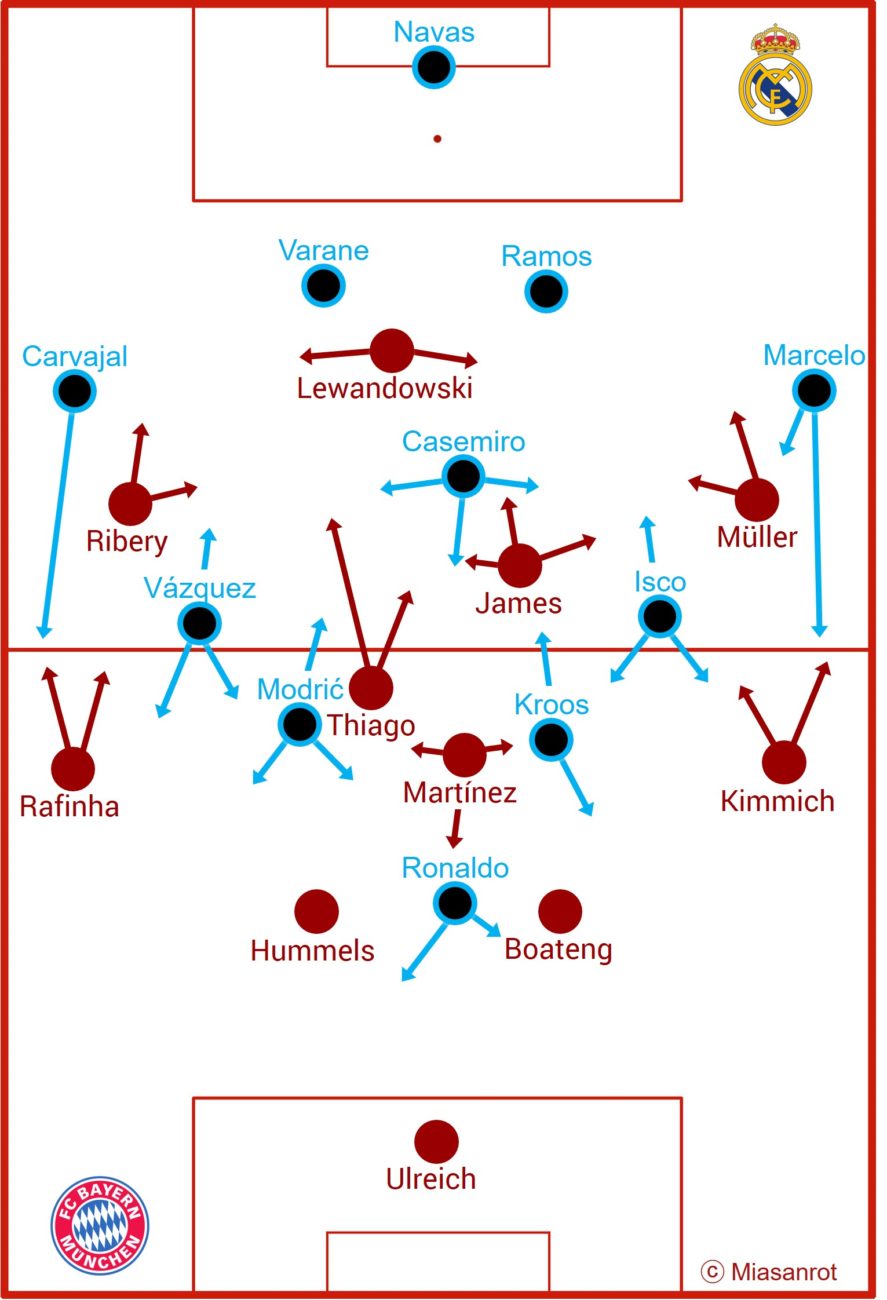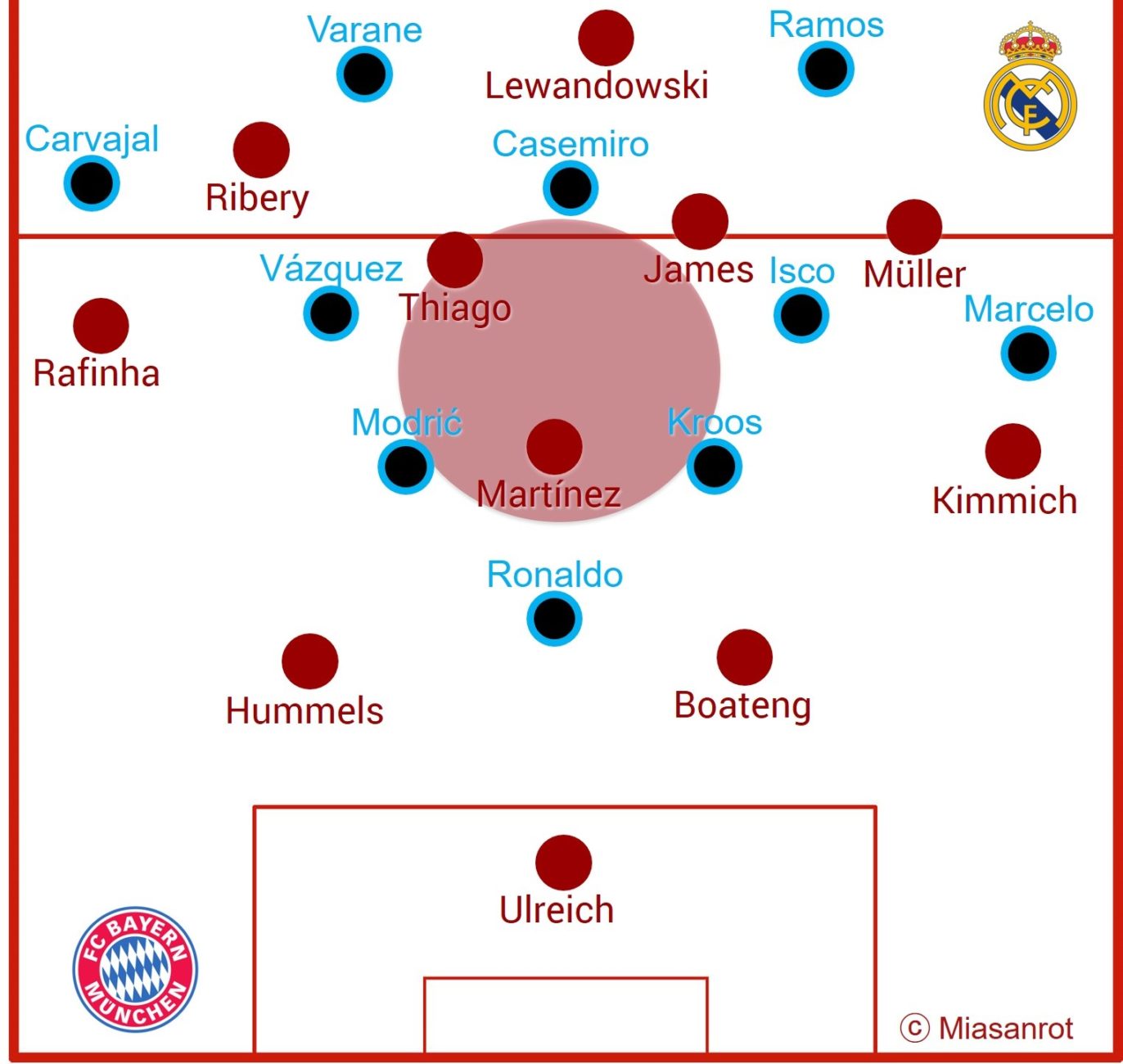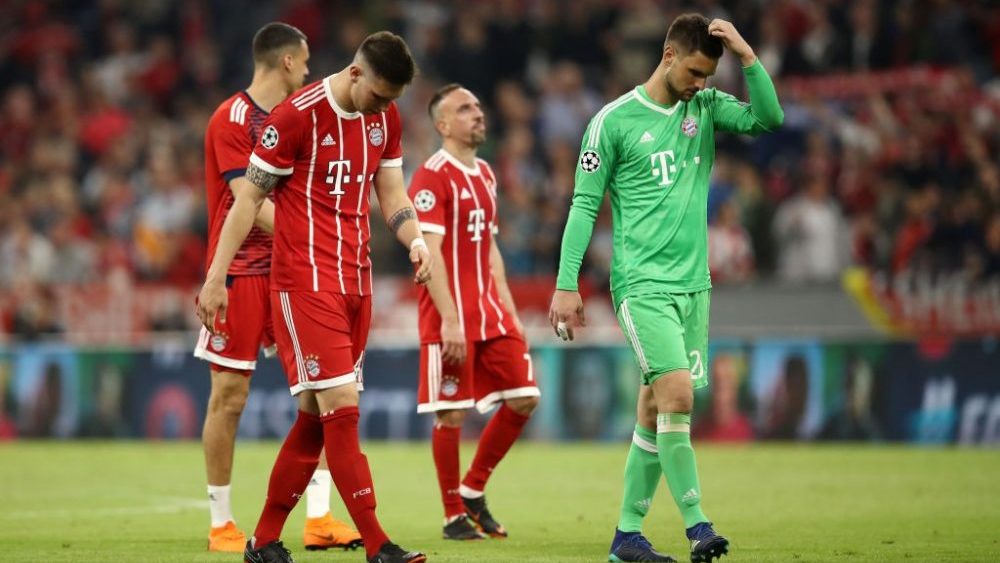FC Bayern München – Real Madrid 1:2 (1:1)
That question hovered over this battle. Now it was down to Bayern to answer it positively.
In case you missed it:
Heynckes didn’t spring any surprises at all in the build-up.
 FC Bayern vs. Real Madrid, basic formations
FC Bayern vs. Real Madrid, basic formationsRafinha played for the injured Alaba, and again Thiago remained on the bench in a big game. With James, Müller, Ribéry, Robben and Lewandowski the coach went with a very attacking set-up.
On the other side, a somewhat more defensive attitude was indicated. Zidane went without Bale and Benzema, selecting Vazquez. The only question before the match was whether Isco would play in the hole or be some sort of left winger.
It got underway with high intensity from the get go, as expected. After good pressing Bayern had the first big chance after mere seconds, but Lewandowski’s set-up was too imprecise, and so Müller missed. Real, too, popped up shortly after, overloading in front of Ulreich’s goal. Kroos did as Lewandowski had though, and missed the lay-off.
This furious opening phase was broken up by the injury to Arjen Robben. The Dutchman felt pain in his thigh and Thiago ended up getting an almost-start after all.
Subsequently there were few obvious highlights. The two teams cancelled each other out with a similar style of play. But when Real Madrid started to put Bayern properly under pressure, the game seemed to swing. However, as it so often is in football, the momentum jumped to the hosts’ side. After a counter-attacking opportunity James played in Kimmich, who put Bayern into the lead (29′).
Bayern could thus retake control, though they had to make another sub with Boateng injured (34′). Süle came in for him.
Hummels (39′), Müller (41′) and Hummels again (42′) each narrowly missed the second goal. And as was the case a few minutes earlier: the team who was actually weaker at the time scored the goal. Marcelo grabbed the equaliser with a volley from the edge of the box. A lovely goal unfortunately (44′).
In the second half the game started off similarly. Bayern had the ball often, and made some good chances too, but weren’t quite able to take them. And so they were punished again. Asensio, subbed on at half-time, put the guests into the lead after an absurd mistake by Rafinha on the half-way line (57′).
Real Madrid from then on simply relied on their qualities in transition. Bayern meanwhile had again the better chances, but remained without a second goal. Almost nothing went right for the five-time Champions League winners.
With increasing tiredness, chances dried up in the closing stages. Heynckes, after the forced changes in the first half, had barely any options either. And so a game that FC Bayern should never have been allowed to lose ended at 2-1 to Real Madrid.
Three things we noticed:
1. Real’s match plan was clinical and good, the application was okay at best
After the open early stages, it became increasingly clear what Zinédine Zidane had planned for this evening. Real pushed up incredibly high at times when pressing. Ronaldo as the central striker was supported, however, by two players who weren’t Vázquez or Isco, but Kroos und Modric. They were in turn given protection in the centre by Casemiro and in the half-spaces by the deep wide players. Carvajal and Marcelo closed the gaps on the ball-near side by pushing up equally high.
By doing so, Zidane closed the half-space areas that Bayern like to play in during build-up play. Martínez was isolated in the centre, the central midfielders taken out of the game, and the areas next to Casemiro were difficult to access as a result. Heynckes’ men were made toothless early on. However, that lasted at most 20 minutes.

Against the run of play, the goal then came from Kimmich, turning everything on its head. Bayern got more confidence, started winning battles in midfield all of a sudden, and so managed at times to get past the first line of the press into the danger areas next to Casemiro. That’s how quickly a good match-plan can be undermined. Madrid reacted flexibly though, dropping a little deeper and played a little more compact in the knowledge that their chance would come. And so it was, too. Admittedly thanks to a wondergoal out of nothing, but they got the important away goal.
Zidane reacted to that once again, and brought Asensio on for Isco to have more pace on the wings during counter opportunities. Those very changes of rhythm by the Madrileños caused Bayern problems over and over. In the whole of the second period, the Galacticos contented themselves with defending and countering.
It was enough to force Bayern out wide and to get access there. The longer the game lasted, the better the guests defended. That was also down to FC Bayern’s tiredness. Madrid were in the right places at the right times, scored twice and were successful again. An average performance was enough to put themselves into a strong starting position. Alarming.
2. Heynckes’ plan had good responses
Jupp Heynckes had also done his thinking before the game of course. He wanted to consciously bypass the centre in the build-up. Martínez made runs constantly to open up space for his team-mates. James, for his part, was meant to resolve tight situations and find solutions along with Hummels and Boateng to evade the Real pressing – if need be with longer passes, dribbles or long kicks.
The aim was to find Müller and the two wingers, who could in turn use Madrid’s weaknesses out wide, or at least have some joy in counter-pressing after long balls.
Initially that didn’t work out quite as desired. Robben’s early injury also put a line through Heynckes’ calculation. Thiago needed some time to get into the game and the set-up had to change as a result of the substitution. Now Bayern increasingly forced their own build-up play, which was too prone to the occasional mistake.
It was via James that Bayern were at times able to play around Madrid’s high pressing and serve Ribéry on the left flank. The Frenchman had perhaps his best game of the season. Carvajal looked like a below-average Bundesliga defender against him.
The general pattern was an opening pass to Müller, James or Thiago, who would then serve Lewandowski or Ribéry either directly or with a shift in position. With just two moves, Real’s team was then cracked.
The plan came off in principle. In the middle of the first half Real had too much space to play, but generally Bayern had their opponents in their grip. They were also able to convince with their pressing, not giving much away principally, and managed to carve out more big chances than the opposition. In spite of that, it wasn’t enough in the end for a positive result.
3. Chance exploitation and short blackouts
Müller, Lewandowski and Hummels had the second goal right at their feet, head or even chest several times. Time and time again they missed, got in each other’s way or were absurdly unlucky.
Real Madrid meanwhile, in a weak period, got into a dangerous position in front of the Bayern goal for the first time in a while, and equalised. In the second half again they scored out of nowhere for the second goal. The difference between FC Bayern and Real can’t be demonstrated any better than that.
In addition there were also unbelievable individual errors. Thiago in the centre was disappointing across the board for the first time. Maybe these lapses in concentration were also the reason why Heynckes went for Robben and a bigger focus on the wings. Either way, everything that had made Thiago so invaluable for such a long time in the past for Bayern deserted him.
His passes weren’t well timed, were too imprecise or simply off target. He put himself under pressure in pressing situations surprisingly often too. Situations where the Spaniard was able to decisively link Bayern’s build-up were all too rare. But he wasn’t alone in that. Hummels played one or two poor passes in the first half, Lewandowski’s conversion of chances was again subpar in a big game, Kimmich revealed some natural weaknesses out of possession…
Not all of that is meant as a reproach. But it’s these little things that decide such big games. Real Madrid made fewer mistakes, were there in the right moments and so won a game that they should never have been allowed to win.
Heynckes’ team simply weren’t clinical enough. It was the same with Bayern last season. And so the German champions travel to Madrid again with a poorer result than was actually necessary. Since, in technical terms, this wasn’t a bad performance from Bayern. Quite the opposite. Utterly unnecessary and avoidable situations were created by Bayern themselves, with Real needing only to quickly flex their biceps to perhaps decide the tie early.
Equally from last season we know that Bayern can turn around such a result in Madrid as well. But being honest, an even better performance is needed, a lot of luck, and much better taking of chances. Impossible is nothing, but in a bizarre way FC Bayern have put themselves in a shit situation.












Unfortunately we also need RM to play at an equally average level at the Bernabeu for us to get a result. Hoping for too much perhaps.
We’ll likely score, maybe even two, but fatigue, lack of options and their powerful bench might decide this tie.
Is Alaba playing next Tuesday?
The same mistakes are being repeated over and over since 2015: too many important injured players that could have been avoided, Lewa and Muller missing too many sitters, and silly mistake leading to conceding goals.
In 2015 Lewa missed a sitter vs Barca, in 2016 Muller was pathetic and missed a penalty, 2017 wasted many chances to make it 2-0 before Ronaldo punished Bayern, and now same thing – injuries, missing sitters! Fed up with those opportunist Madrid sides and the Bayern injuries